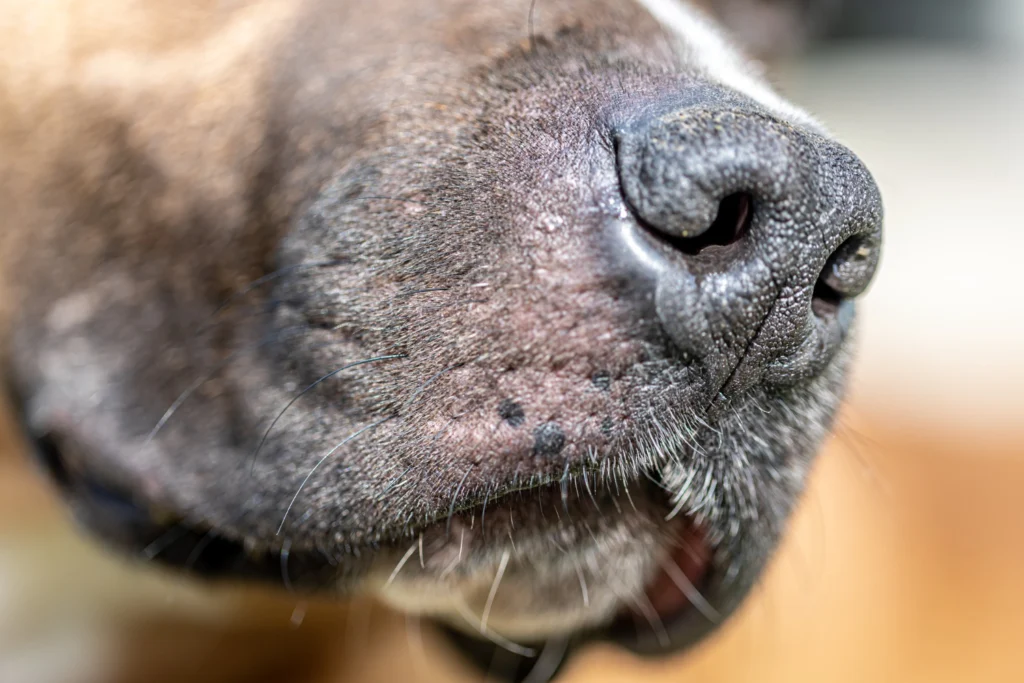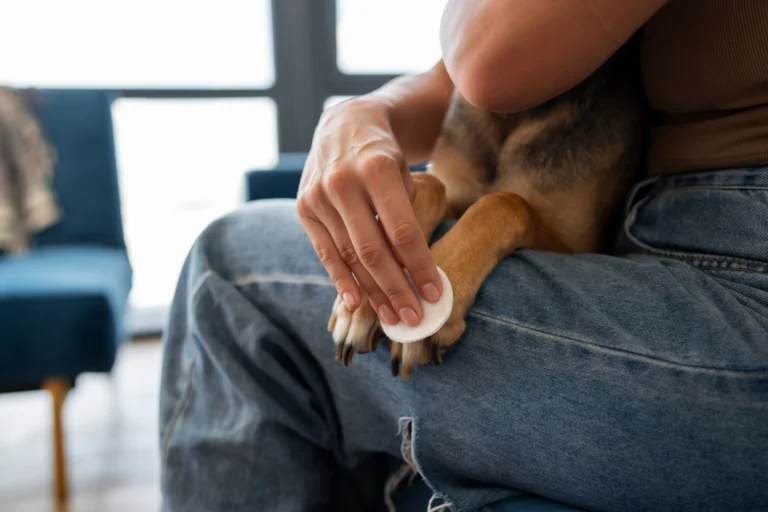Top 5 Natural Remedies for Dog Skin Allergies: Relief & Prevention Guide
Table of Contents
Natural remedies for dog skin allergies are the best way to help owners . Dry dog skin remedies are easy to find and can make your pet feel better.
Every dog faces skin problems at some time. Allergies, the environment, and diet can cause skin issues. Knowing these causes helps in treating and preventing them.
Vets suggest a natural way to keep dog skin healthy. Using natural remedies, good food, and regular care can help. This way, your dog’s skin stays strong against allergies and swelling.
Key Takeaways
- Natural remedies can effectively address most dog skin allergies
- Identifying triggers is crucial for long-term skin health management
- Diet plays a significant role in skin condition and immune response
- Regular grooming helps detect and prevent skin issues early
- Home treatments can complement professional veterinary care
Understanding Common Dog Skin Allergies and Their Symptoms
Dog skin allergies can be tough for pets and their owners. Spotting the signs early helps treat itchy skin better and makes your pet feel better.
Dog skin allergies show up in many ways, affecting their comfort and health. To treat dry skin, first, you need to know what causes it.
Signs of Allergic Reactions in Dogs
- Excessive scratching or licking
- Red, inflamed skin
- Hair loss in specific areas
- Recurring ear infections
- Persistent skin bumps or rashes

Different Types of Skin Allergies in Dogs
| Allergy Type | Common Symptoms | Typical Triggers |
| Food Allergies | Skin irritation, digestive issues | Protein sources, grains |
| Environmental Allergies | Seasonal itching, respiratory symptoms | Pollen, dust, mold |
| Flea Allergy Dermatitis | Intense scratching, skin inflammation | Flea saliva |
Identifying Allergen Triggers
Finding out what causes your dog’s skin allergies takes some work. Keep a detailed record of your dog’s symptoms, diet, and environmental exposures. Tests can find out what’s causing the problem and help find the right treatment.
“Understanding your dog’s unique skin sensitivities is the first step towards effective relief and comfort.” – Veterinary Dermatology Experts
If your dog keeps having skin problems, see a vet. They can offer treatments that fit your dog’s needs.
How Do You Treat Dry Skin for Dogs: Essential Home Solutions
Dealing with your dog’s dry skin can be tough. But, there are effective ways to keep their skin hydrated at home. Learning how to moisturize your dog’s skin can prevent discomfort and skin problems.
First, find out what’s causing the dry skin. Things like the environment, what they eat, and how you groom them all matter.
- Increase omega-3 fatty acid intake through diet
- Use specialized dog moisturizing shampoos
- Maintain consistent grooming routine
- Control indoor humidity levels
Changing their diet is key to keeping their skin hydrated. Adding fish oil or switching to better dog food can help a lot.
“Healthy skin starts from the inside out” – Veterinary Dermatology Experts
For quick relief, try natural treatments. Coconut oil and aloe vera are good for moisturizing. But, always check with your vet before trying anything new, especially if their skin problems don’t go away.
| Treatment | Benefit | Application |
| Fish Oil Supplement | Reduces Inflammation | Daily with meals |
| Coconut Oil | Skin Moisturization | Topical application |
| Humidifier | Prevents Dry Air Damage | Continuous room use |
If your dog’s dry skin doesn’t get better, it might be a sign of a bigger health issue. Always get your vet’s advice for the best care for your dog’s skin.
Natural Remedies for Dog Skin Allergies
Discovering natural remedies for dog’s dry skin can greatly improve your pet’s comfort and health. Many pet owners look for ways to nourish their dog’s skin naturally. These gentle treatments can help soothe irritation, reduce inflammation, and aid in healing without using harsh chemicals.
Coconut Oil: Nature’s Skin Healer
Coconut oil is a standout natural remedy for dog skin nourishment. It has antimicrobial and anti-inflammatory properties. These make it great for:
- Reducing skin irritation
- Moisturizing dry, flaky patches
- Fighting potential fungal infections
- Promoting a healthy, shiny coat
Soothing Oatmeal Treatments
Oatmeal is amazing for dogs with sensitive skin. Colloidal oatmeal is especially effective in natural remedies for dog’s dry skin. It provides:
- Instant itch relief
- Gentle skin hydration
- Protection against environmental irritants
“Natural healing starts with understanding your dog’s unique skin needs.” – Veterinary Dermatology Experts
Herbal Solutions for Skin Healing
Several herbs can help support your dog’s skin health naturally. Calendula, chamomile, and aloe vera have remarkable healing properties. They can:
- Reduce inflammation
- Accelerate skin repair
- Provide natural antiseptic benefits
Always talk to your vet before starting any new skin treatment. This ensures it’s right for your dog’s specific needs.
Preventive Care and Daily Maintenance for Dog’s Skin Health
Keeping your dog’s skin healthy needs regular care. Protecting their paw pads and skin involves grooming, nutrition, and watching them closely.
Regular care can stop many skin problems. Begin by making a routine for your dog’s needs:
- Check your dog’s paw pads every day for cracks or damage
- Use gentle, pet-specific moisturizers for their paw pads
- Trim fur between paw pads to stop moisture buildup
- Clean paws after walks to remove irritants
Diet is key for skin health. Your dog’s diet directly impacts their skin and coat health. Here are some diet tips:
| Nutrient | Benefit for Skin Health | Recommended Sources |
| Omega-3 Fatty Acids | Reduces inflammation | Fish oil, salmon, flaxseed |
| Zinc | Supports skin repair | Lean meats, pumpkin seeds |
| Vitamin E | Promotes skin healing | Sunflower seeds, almonds |
“Prevention is always better than cure when it comes to your dog’s skin health.” – Veterinary Dermatology Experts
Grooming is vital for skin care. Brush your dog regularly to spread oils, remove dead skin, and find skin problems early. Use hypoallergenic shampoos to keep their skin’s natural oils.
Remember, the environment affects your dog’s skin. Keep them away from extreme weather, harsh chemicals, and maintain good hygiene. This helps prevent paw pad cracks and other skin issues.
Conclusion
Managing your dog’s skin health needs patience, understanding, and action. Natural remedies can help a lot with allergies and dry skin. By spotting symptoms early and using home treatments, your dog can feel better and be more comfortable.
But remember, home remedies might not solve everything. If your dog’s skin problems don’t go away, it could mean there’s a bigger health issue. Dr. Karen Becker from Natural Pet Care suggests using natural treatments and getting help from vets.
Learning about skin allergies and how to prevent them shows you truly care about your pet. Regular grooming, the right food, and watching your dog’s skin can stop many problems. With the right knowledge, your dog’s skin will stay healthy and strong.
Your love and effort are key to keeping your dog healthy. By staying informed and watching your dog closely, you can handle skin issues and give your pet the best care.
FAQ
What are the main reasons dogs develop dry skin?
Dry skin in dogs can come from many things. This includes the weather, allergies, not enough nutrients, hormonal problems, and health issues. Common causes are low humidity, harsh grooming products, a bad diet, and seasonal changes.
Health problems like hypothyroidism or allergies can also cause it.
How can I recognize if my dog has a skin allergy?
Look for signs like too much itching, red skin, hair loss, and ear infections. Also, watch for licking or chewing in certain spots, rashes, and bumps. If these signs keep happening, see your vet.
Are home remedies effective for treating dog skin issues?
Home remedies can work for mild skin problems. Coconut oil, oatmeal baths, omega-3 supplements, and good grooming can help. But, if your dog’s skin problems are bad or don’t get better, you need a vet.
How frequently should I bathe my dog if they have dry skin?
Bathing your dog with dry skin needs care. Bathe them every 2-4 weeks with a moisturizing shampoo. Don’t bathe too much, as it can dry out their skin more. Use lukewarm water and products made for dogs.
Can diet impact my dog’s skin health?
Yes, your dog’s diet is key to their skin health. They need a balanced diet with good proteins, omega-3 and omega-6 fatty acids, and nutrients. Supplements like fish oil can also help keep their skin moist and reduce inflammation.
What natural ingredients are good for dog skin care?
Many natural ingredients can help your dog’s skin. Coconut oil, aloe vera, chamomile, oatmeal, and fish oil are good. Begin with small doses and observe your dog’s reaction.
When should I see a veterinarian about my dog’s skin issues?
See a vet if your dog’s symptoms don’t go away. This includes severe itching, open sores, a lot of hair loss, and infections. Also, if home remedies don’t work in a week or two, get professional help.
How can I prevent dry skin and allergies in my dog?
To prevent dry skin and allergies, do several things. Feed a balanced diet, use gentle grooming products, brush them regularly, and control allergens. Also, give omega fatty acid supplements, keep them hydrated, and take them to the vet for check-ups.
Can seasonal changes affect my dog’s skin?
Yes, seasonal changes can affect your dog’s skin. Winter’s dry air and indoor heat can dry out their skin. Summer’s heat and allergens can also cause problems. Change your dog’s skin care routine with the seasons.
Are there any quick home remedies for immediate skin relief?
For quick relief, try oatmeal baths, diluted apple cider vinegar, coconut oil, and keeping them hydrated. Cool compresses can also soothe irritated skin. Always watch how your dog reacts to these treatments.







